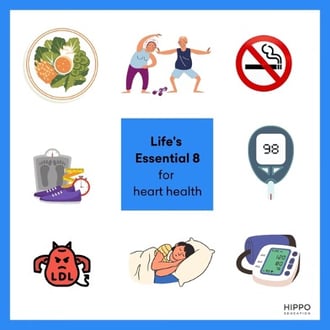3 Primary Cardiac Prevention Tips for the PCP

When helping primary care patients navigate heart disease prevention, we all know the big interventions to cover: quitting smoking, exercising, and eating a healthy diet with more plant-based foods. But are you also covering these less prominent risk factors?
Sleep
In 2022, the American Heart Association released “Life’s Essential 8,” an update on the “Simple 7,” critical health behaviors that contribute to cardiovascular health. These included: stop smoking, eat better, get active, manage a healthy weight, manage blood pressure, control cholesterol, reduce blood sugar. The somewhat surprising addition? Sleep.

Sleep is a recognized risk factor for cardiovascular health, particularly because of its effect on hypertension. Shift work, sleep apnea and short sleep duration have all been shown to worsen blood pressure.
The bottom line: Ask your patients, “Do you have any problems falling asleep, staying asleep, or sleeping too much?”
Obstetric Complications
There has been a clear link established between cardiovascular complications of pregnancy and CVD risk. Women who have had preeclampsia, gestational hypertension or gestational diabetes have an increased risk of essential hypertension, diabetes, MI and stroke.

A history of preeclampsia confers a 3x relative risk for developing cardiovascular issues compared to women with no preeclampsia. Preterm delivery and stillbirth are also associated with cardiovascular risk.
Bottom line: Ask about obstetric history to assess CV risk, then counsel about increased risk and consider closely monitoring preventable CV risk factors including BP and Hba1c.
Erectile Dysfunction
Erectile dysfunction (ED) is an independent CV risk factor: men with ED are at a 50-60% higher risk for cardiovascular disease than men without ED. Men with ED also often have many CVD risk factors such as smoking, diabetes, metabolic syndrome and a sedentary lifestyle.
The bottom line: Provide healthy lifestyle counseling for men with ED.
For more on primary prevention and heart health, listen to “Heart Failure for the PCP,” Neda Frayha’s interview with cardiologist Dr. Stan Liu from the Primary Care Reviews and Perspectives, or see our full episode summary here.
Want to hear more from our experts? Listen to the full podcast episode here.
Practice-Changing Education
Experience education that goes beyond theory. Explore Hippo Education’s offerings below.


